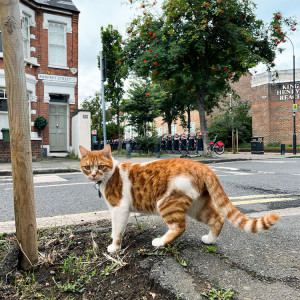What to Do If Your Cat Goes Missing
Cats might be curious creatures, but when yours goes missing it can send the most composed pet parent into a spin

Share Article
Your cat might pretend you’re just there to be at their beck and call – feeding them, providing treats and doling out scratches – but the bond between feline and human runs much deeper than that. Cats, with their enigmatic charm and… independent spirits are cherished members of the family. So the heart-wrenching sudden absence of a beloved feline friend can leave us feeling helpless and anxious. When your cat goes missing, it's crucial to act swiftly and calmly to maximise the chances of a safe reunion.
From understanding the reasons behind their disappearance to implementing effective search-and-rescue techniques, staying calm, organised and proactive can increase the likelihood of bringing your furry friend back home where they belong. Here’s everything you need to know to be reunited with your missing cat.

Get (totally free) deals for food, treats, accessories, tech and way more pet parenting must-haves.
What to do if your cat goes missing
Stay calm
First things first, take a deep breath. It’s natural to panic when you feel like you’ve lost your furry best friend (cats always know they’re number one). But cats are notorious for their solo missions, so don’t jump to wild conclusions just yet. Your stealthy ninja cat might just be on a secret mission to conquer the neighbourhood.
Check the usual spots first
Cats are creatures of habit, so check their favourite snoozing spots, hidey holes and cosy corners. You might be surprised where they’ve decided to take a catnap; “the first thing to do is to check your own home and garden. Cats love small, cosy spaces and might be hiding in the unlikeliest of places – from cupboards to garden sheds,” says Louise Waters, a Cats Protectionopens in new tab spokesperson.
“Check every room in your house, including any outbuildings, behind curtains, under duvets and even in household appliances like tumble dryers and washing machines. If you’re having building work completed, check under floorboards or any holes big enough for a cat to nestle into,” she adds.
Enlist help
“If you’re sure your cat isn’t at home, the next thing to do is to speak to your neighbours as well as any delivery people nearby,” says Louise. “They might have seen your lost cat somewhere and can let you know of their whereabouts.” Ask them to check their own sheds and outbuildings, as well as under any parked cars in the neighbourhood. Remember to check homes on both sides of the road, as well as homes that have gardens that back on to yours.
Creating posters with clear pictures of your cat, with a description of any distinguishing features too, plus at least two contact numbers to put around your local area can be a big help too; having a reminder for neighbours and locals will remind them to keep an eye out for Fluffy to return home safely. Battersea has a templateopens in new tab you can use if your mind isn’t up to being creative when you’re feeling worried.
Next, share your cat’s adorable face on social media; you’d be amazed at the power of a cute cat pic. “Advertising on social media is also a great way to get the message out that your cat is missing, particularly if you’re a member of a local Facebook community group,” adds Louise. “Post a clear photo of your cat, their name and your contact details. Make and put up flyers with your cat’s photo and description to place around the local area – or post them through your neighbours’ letterboxes.”
Flag as missing
Contact local vets, charities and rescue centres in your area to register your cat as missing, Cats Protection have a useful checklistopens in new tab of what to do when you think your cat has gone missing. If your cat is microchipped (and it‘s now the lawopens in new tab if you live in England) you can contact Petlog or Identibase to register your cat as missing. “Microchipping your cat is the most effective way to ensure that they can be identified if they go missing,” says Louise. “If they do, the microchip would be scanned with a microchip scanner and matched to your contact details, which are kept on a cat microchip database.”
“Keeping your details up to date can increase the likelihood of a happy reunion as it means you’ll be contacted quickly if your cat is found and taken to a vet or animal welfare organisation,” she adds.
Leave out familiar items
Not all cats are house cats – some are inclined to wander, especially if there is fuss or food to be found elsewhere. Cats are heavily reliant on scent and leaving out items that may entice them back to you is well worth an attempt. Set up a home base with your cat’s favourite blanket, toys or even a piece of your worn clothing. Familiar scents can act like a homing beacon, guiding your wandering furball back to the comfort of home. Louise recommends trying the following:
Leave your cat’s favourite toy or some of their unwashed bedding in the garden.
Leave an unwashed item of your clothing, which will have your scent on it.
Place any used litter from your cat’s litter tray outside, or even the contents of your vacuum cleaner for a smell of home.
Call out for your cat in the garden early in the morning or late at night, when everywhere is likely to be quieter.
Shake a box of their favourite biscuits or treats.
How to mitigate your cat going missing
Whilst you can’t guarantee your cat won’t ever run off (cats often have a very strong-willed mind of their own, after all) certain environments are more taxing on your little kitty, so doing your best to minimise those situations can help to mitigate any games of hide-and-seek. “Cats often go missing during a house move as they find it very stressful so it’s important to keep them in at first,” says Louise. “Allocate a room where there are blankets and beds that have their smell on and provide them with fresh water and a clean litter tray. Don’t force them if they’re worried and don’t want to come out of their carrier. Just leave the door open and they’ll come out when they’re ready.”
You should keep your cat in their room for the first few days to help them to settle in, she adds. When they’re ready, let them explore the rest of the house at their own pace. Be sure to leave their door open when they start to go into the rest of the house so they have somewhere safe to run to if they feel overwhelmed and make sure that all windows and doors to the outside are closed at this point.
Cats Protection recommends waiting at least three weeks before allowing your cat to venture into the outside world, to give them enough time to regard their new space as ‘home’ and build up enough of a scent profile to know how to get back. Many cats go missing after a house move as the pet parents let them outside too soon, and they can find their way back to their old homes. Make sure your cat is microchipped, and that the registered details are up to date with your new address, so again, if the worst should happen and they run off, you can be reunited safely.
When you’re sure they’re ready to head outside, Cat Protection recommends that you:
Do it just before a mealtime when they are hungry so you can call them back with their favourite food.
Open the door and step outside encouraging your cat to go with you.
Don’t pick them up – let them make the decision to go outside themselves.
Leave the door open so they can run back into the house if they feel insecure.
Only let them out for short periods at first – you can gradually build up the time they are out until you are confident they can come and go as they please.
Sometimes, cats sadly wander off when they know that they’re nearing the end of their life. If the worst happens and you discover that your missing cat has died and you’re experiencing pet-related grief, Cats Protection offers a free support service. You can call the confidential hotlineopens in new tab to talk to a trained volunteer listener.
However, more often than not your little kitty is off on a neighbourhood adventure or staring down the local pigeons. They might be your little fluffball of cuteness, but cats can be boisterous by nature at the best of times. So next time your heart drops when you can’t find Mittens (because knowing cats, there will be a next time) stay calm, follow the advice and get proactive; the sooner you act, the better your chances of bringing your furry friend back home.

Orla Pentelow
Orla Pentelow is Kinship UK’s Senior Editor. She has previously written for British Vogue, Bustle, Yahoo and The Telegraph. When not at her desk liking dog videos she’s out and about with her rescue pup, Luna, who works primarily as chief distractor.
Related articles
![dark-haired woman hugging cat that has imprinted on her]()
10 Signs Your Cat Has Imprinted On You
Feeling like you have a little shadow these days? A cat behaviourist explains why that’s happening
![A ginger and white cat standing on a London street.]()
Is It Safe to Have an Outdoor Cat in the UK?
Free-roaming felines are much more common here than in other parts of the world – we uncover the reasons why
![]()
How To Create a Cat-Safe Garden
Green fingers at the ready
![A woman with tattoos hugging her white cat in a cluttered, art-filled room]()
How to Stop Your Outdoor Cat From Moving in With Your Neighbours
Thanks to your neighbour’s treats, your kitty’s over-the-fence visits are starting to become uncomfortably regular...
![cat lying on windowsill looking sad]()
How Long Can I Leave My Cat Home Alone?
With automatic feeders and self-cleaning litter trays, your cat could technically look after themselves... but should they?








